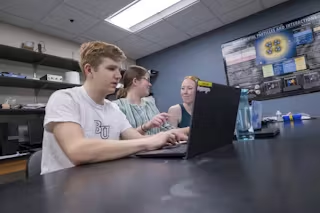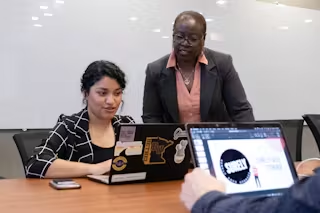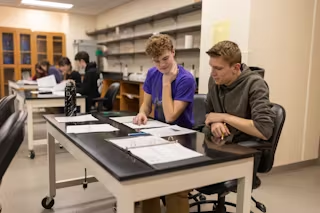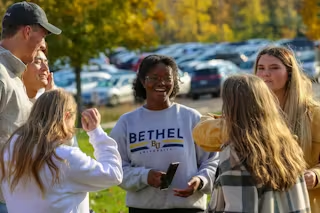
Undergraduate Academics
Undergraduate Academics
In all of our 100+ areas of study, you’ll experience outstanding preparation that will equip you for your career and help you reach your full potential. You’ll be prepared to address the world’s challenges—no matter your chosen field.
Majors, minors, and more
You’ll find undergraduate degree programs that represent the full breadth of the arts, sciences, healthcare, education, business, and humanities. And our numerous minors, endorsements, and preprofessional programs offer opportunities for you to explore your interests and specialize—and meet your future career goals.
Still choosing a field of study?
That’s okay! Every year, many students start at Bethel without knowing their major, and 30% go on to earn more than one major. As you get started in general education courses, you’ll find where you belong—and become who you’re meant to be.
Check out this resource for help choosing your college major!
91%
of seniors rank their Bethel education as good or excellent
99%
recent graduates are employed or continuing their education
What makes our programs unique?

Transformational academics will help you develop your career path—and they'll equip you to address the world’s challenges in your chosen field. The Career Development and Calling office will also help you prepare for your career and discover ways to use your gifts to make a difference.

Our faculty are distinguished scholars and faithful Christians who will know you by name and invest in your success. Far more Bethel students conduct research with professors than the national average, according to national survey data, through opportunities like the Edgren Scholars program.

Hands-on learning is a pillar of all Bethel academics. In all our undergraduate degree programs, you’ll have the chance to apply what you’ve learned. Almost all Bethel seniors apply classroom lessons and gain experience through high-impact practices like internships, research, service learning, and more.

Study abroad and mission trips provide opportunities to study and serve in spots around the world and learn about cultures by experiencing them for yourself. With 600+ semester, January session, and summer programs to choose from, far more Bethel students study abroad than the national average.

Early college and summer courses offer opportunities to jumpstart your undergraduate degree—and your career. PSEO and dual/concurrent enrollment options give you the chance to take bachelor's degree courses and earn college credit while completing high school. Summer courses—many of which are online—offer the flexibility to graduate early or pursue multiple majors, minors, or endorsements.

Our vibrant, Christ-guided community cares about who you are and who you’re becoming. From classroom to extracurriculars and beyond, you’ll find a place where you belong. At Bethel, we challenge one another to learn, grow our faiths, and become who we’re meant to be.


